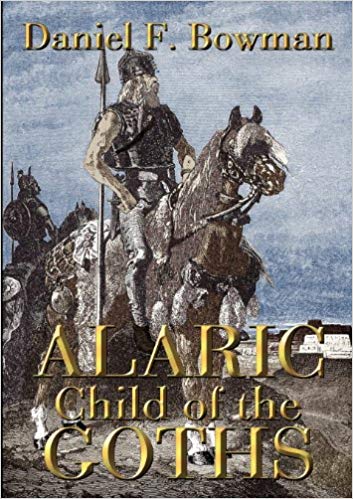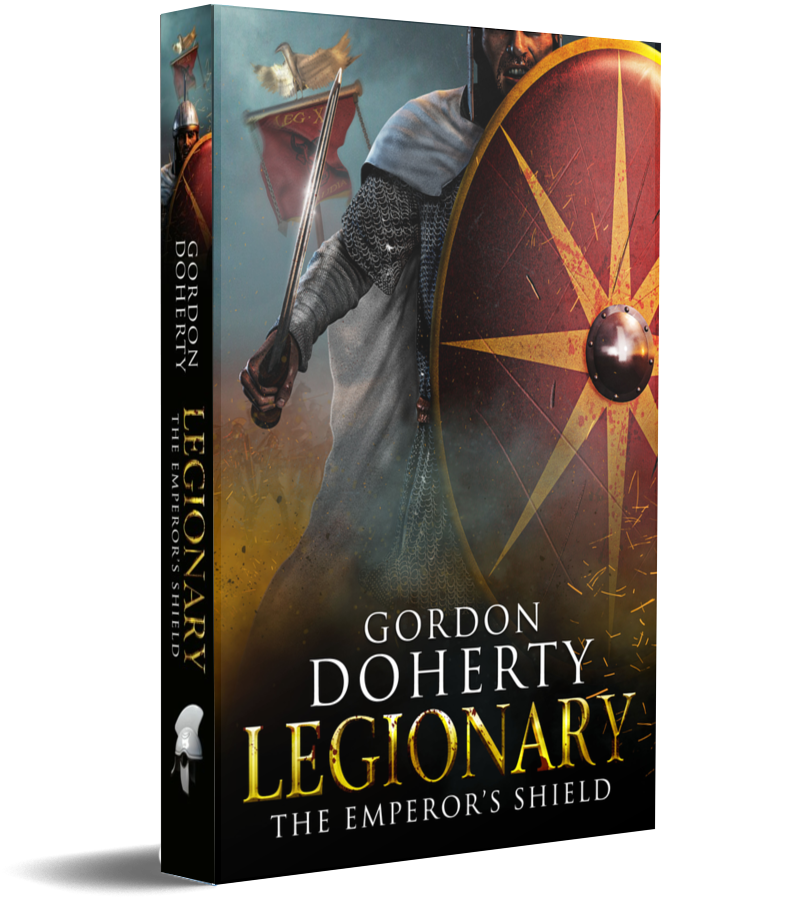Gordon: What information did you use for this time period? What sources are still around from that time? I'm particularly interested in your sources for authentic Gothic customs/beliefs etc.
Daniel: I enjoyed writing Alaric in part because of the lack of sources—no one can tell me I was wrong! I was able to invent aspects of their religion without it being false, such as the ceremony in the sacred grove. But other parts were fun to write because of the history. For example, Alaric and his friend Athwaulf end up being brother-in-laws, so you can guess where the story may continue. As far as original sources, Jordanes was helpful for Gothic history. Regarding the Roman background and Adrianople, Ammianus Marcellinus (Book 31) is a thrilling read, especially for an ancient history book. The best secondhand sources involved everything by P. Heather and H. Wolfram. I also used “Everyday Life of the Barbarians” by Todd, adapting the information to make the Gothic culture. As far as “kamon,” the alcoholic drink, I found information from Priscus of Panium. Gordon: I see that you are a devout Christian. Alaric: Child of the Goths is set in the formative centuries of Christianity, with Arianism and the Nicene Creed dispute making it a complex time. In your research for the novel, did you find anything in this area that surprised you? Daniel: At the time of Alaric, a single letter caused one of the largest fights among Christians. “Homoousion,” meaning that Jesus is God, was supported by the Nicene Creed. In opposition was “homoiousion,” followed by the Arians, which meant Jesus is like God. Notice the difference—“i”—1 letter! I was most surprised to find that important Roman figures like Emperor Valens were Arian, as I had thought that everyone after Emperor Constantine was Catholic. Many barbarian nations also were Arian, which prevented them from assimilating into the Roman culture. Gordon: Which of your characters would you most like to meet? Any that you’d be afraid of? Daniel: I have already met most of the characters, having plenty of deleted scenes—things that never made it into the novel. If you’ve ever read “Ink Heart,” I am like Fenoglio, so curious to see my creations just as I imagined them. Mostly, though, I want to meet Riza, Alaric’s mother, because I really know nothing about her. On the other hand, I’m terrified of Sarus, Alaric’s nemesis, since I was bullied as a kid. He reminds me of people I used to fear. I don’t look forward to his return. Gordon: Have you tried anything from your books or the time period—cooking the strange foods from the banquets, learning classical Latin, or training with a spatha or veruta? Daniel: I can read basic Latin, especially from the Vulgate Bible, as well as make up really simple Gothic sentences. It’s surprising that when the Bible was translated into Gothic, the translators left out “I and II Kings,” thinking that the Goths needed no encouragement for violence. As far as food, I smell like a Roman: I use plenty of olive oil and garlic when I cook, and I am willing to try jellyfish if the price is right. Gordon: Alaric: Child of the Goths is your first novel. Alaric's time on this earth was an intriguing one, but what particular aspect of his life was the deciding factor for you to write about him? Daniel: “Alaric” began on a vacation. After my wife Amanda and I visited the Toledo Zoo, she was wiped out from walking all around, so I watched the History Channel while she fell asleep. We’ve never had cable, so this was one of the best parts of the trip! I stared at the screen as I heard how a group of farmer-soldiers was cheated by Rome but decided to stand up to her, the rulers of their world. They would not put up with bullying. The program ended: “Oppression sires rebellion, and when pushed too far, even the weak and the shattered can rise to challenge their oppressor.” I feel chills every time I hear that. Gordon: Tell me about yourself personally. What do you do outside of your writing? Daniel: I teach English as a second language to students from over fifteen countries. The majority of students are from Saudi Arabia, which influenced my next book, tentatively titled “The Hammer of God: Charles Martel.” I was curious to discover what happened when the Muslim hordes met the Christian phalanx at the epic battle of Tours, determining the fate of the souls of Europe Thanks for the chat, Daniel! Visit Daniel's Website
0 Comments
Leave a Reply. |
AuthorGordon Doherty: writer, history fan, explorer. My Latest BookArchives
March 2023
Categories |



 RSS Feed
RSS Feed